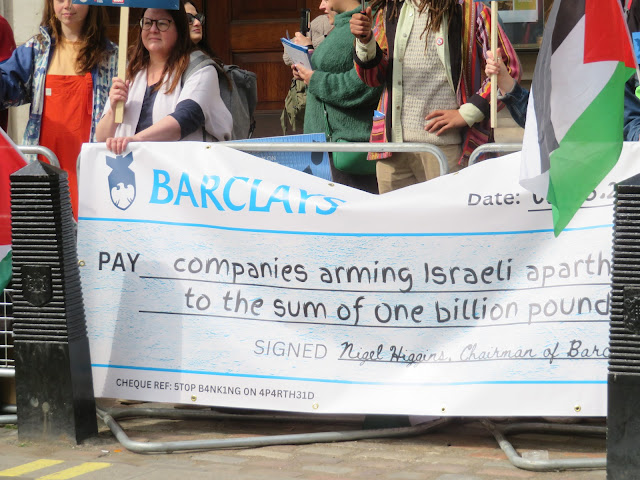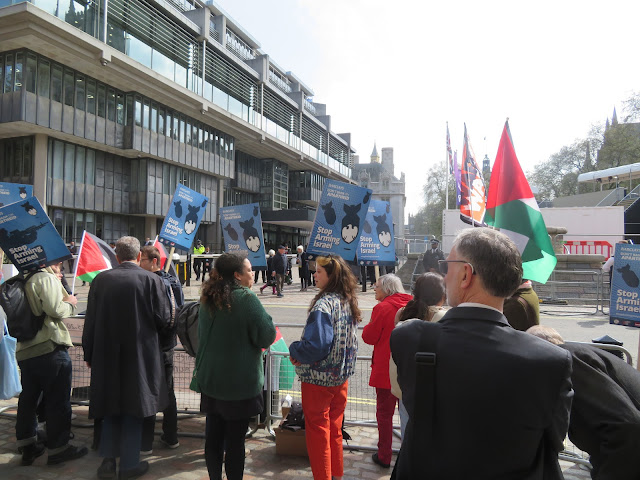Palestine Solidarity, Campaign Against Arms Trade, War on Want were drawing attention to Barclay's funding of arms companies and the subsequent use of those arms against Palestinians and other populations.
Palestine Solidarity said:
Militarised violence against the Palestinian people is a central feature of Israel’s occupation and apartheid regime – including the illegal Apartheid Wall, demolitions of Palestinian homes, brutal armed crackdowns on Palestinians protestors, and indiscriminate bombing campaigns of the Gaza Strip.
This system is maintained through the involvement of governments and business enterprises around the world. Financial institutions in the UK provide investment, loans, and other financial services to companies supplying Israel with weapons and military technology used to oppress Palestinians.
We’ve uncovered that Barclays Bank holds over £1 billion in shares, and provides over £3 billion in loans and underwriting to 9 companies whose weapons, components, and military technology have been used in Israel’s armed violence against Palestinians. By providing investment and financial services to these arms companies, Barclays facilitates the provision of weapons and technology for Israel’s militarised repression of Palestinians.
Alongside War on Want and Campaign Against Arms Trade, we're calling on Barclays Bank to #StopBankingOnApartheid
Climate campaigners were focusing on Barclay's investments in fossil fuels amidst a climate crisis.
This afternoon XR issued the following press release:
A major bank funding our extinction by pouring billions of pounds into new fossil fuel projects was left in disarray today as activists linked to a huge new climate crisis coalition disrupted their Annual General Meeting headquarters in the City of London.
The board of directors faced constant interruption and challenge making it almost impossible for the AGM to continue. When Barclays chairman Nigel Higgins tried to outline the bank’s own climate commitments, a protester shouted “bullshit.”
At 11am teams of activists infiltrated the AGM of Europe’s biggest funder of fossil fuels, Barclays. [1] A 70-strong Climate Choir sang a climate crisis version of the Spice Girls “Stop Right Now” to bank board members. Further disruption followed as other shareholders from Fossil Free London, with a Shakespearean condemnation of Barclays as being on the wrong side of history.
Pulling out hidden ruffs and quills, they performed Shakespeare-based lines generated by ChatGPT about the bank’s funding of fossil fuels. Lines included: “The people thee harm, and our air thou pollute! And yet, there is more, I tell you this day, For Barclays is guilty in a vile way. Thou art on the wrong side of history, I say!”
At the action, Claude Fourcroy, of Money Rebellion, an off-shoot of Extinction Rebellion, said: “We need UK banks to stop funding fossil fuels today, but instead they are profiting from a rigged system where bankers sacrifice people and planet to make vast fortunes. This is why we have chosen to target these vastly wealthy and powerful establishments, in the interests of the public – because time for humanity and every other species on the planet is running out.
“These banks boast about being part of the solution to the climate and ecological emergency while taking baby steps toward pulling funding for the worst fossil fuel criminals, making empty promises full of loopholes, and greenwashing on an industrial scale
“The government and Bank of England are failing to challenge or regulate the power of the banks. But people power can and will stop them. No more carbon bombs, no more genocide and no more displacement. Until the banks stop funding new fossil fuels, we will use every tool in the box to stop them, including building the biggest bank boycott in history to hit them where it hurts – in their pockets.”
The action against the big name financier came just a week after 200 environmental and social justice groups staged The Big One in the streets around Parliament.
The unprecedented event drew up to 100,000 protestors across the four days, to become the biggest single-location climate protest in British history. It included the delivery of two collective demands to stop all new fossil fuel projects and set up emergency citizens assemblies to manage a swift and just transition to a post-carbon future.
When the government failed to respond to the demands by a 5pm deadline on Monday April 24, 50 of the groups at the Big One, including Extinction Rebellion, Money Rebellion, Greenpeace and War on Want, vowed to step up their campaigns and actions.
Extinction Rebellion co-founder Clare Farrell said: “These Money Rebellion actions disrupting financial power holders are just the start of an unprecedented movement of movements stepping up to challenge the corrupt elite in order to drive the urgent changes we need for survival of life on this planet.”
“In this new phase of Extinction Rebellion, we are connecting across groups to build a stronger climate alliance aimed at community resilience, inclusivity and fairness for all living beings. By linking up everyone who stands for a just and rapid response to the climate crisis we will create a formidable opposition. People are determined to challenge the misuse of power which threatens to bring an end to all life if we do not stop it.”
Barclays’ AGM was targeted by activists because the bank is the largest financier of fossil fuel expansion, heavily funding new fossil fuel exploration and drilling, while issuing net zero pledges.
According to Rainforest Action Network and Greenpeace since 2016 Barclays has been the worst bank in Europe for fossil fuel financing. In 2022 alone, the bank provided over $16 billion to coal, oil, and gas companies, and $190 billion since the Paris Agreement, making it the seventh largest fossil fuel funder in the world.
Barclays has said it is committed to aligning its financed emissions with the goals of the Paris Agreement, but in reality the bank has no policy dictating how it should reduce its financing of the oil and gas sector. Barclays is one of the only major UK banks which has not started the process of restricting financing for new oil and gas, putting it at odds with competitors HSBC, Lloyds, and NatWest.






